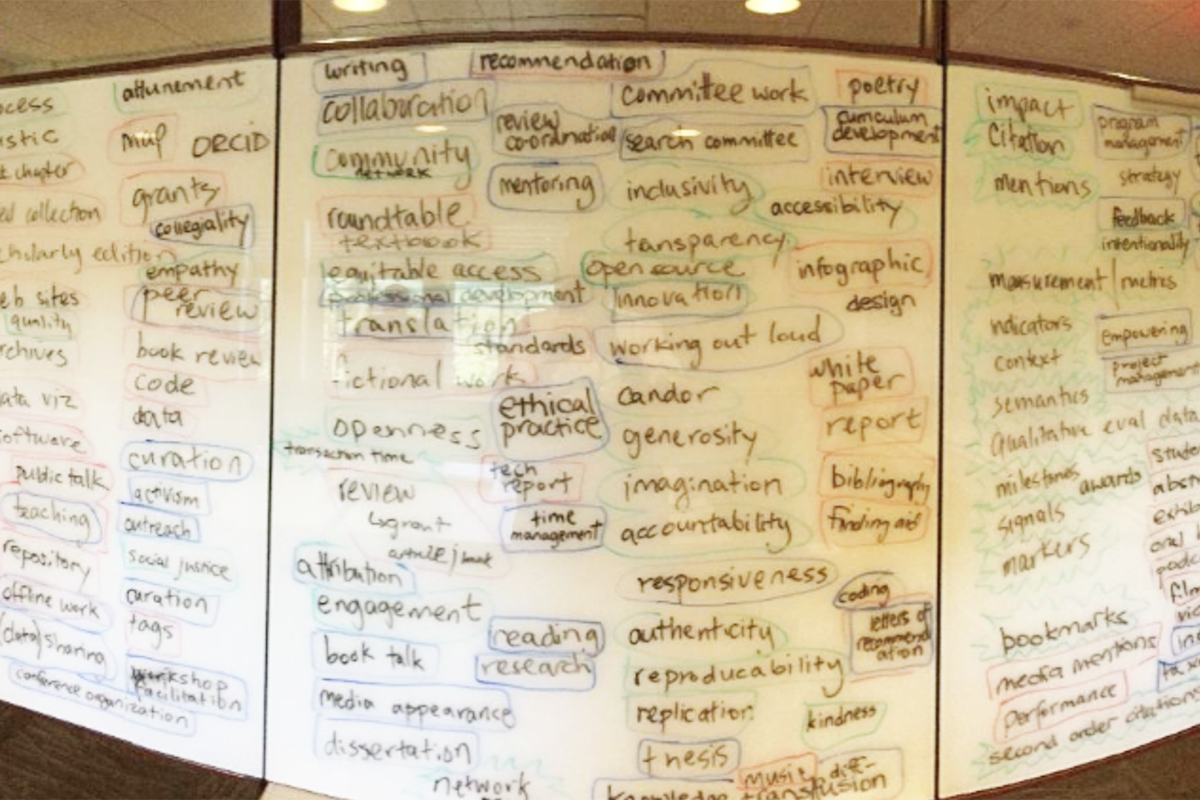
by Sarah Bender
In August 2024, the Mellon Foundation awarded a three-year, $650,000 grant to the University of Oregon to support a new institute aimed at transforming the culture of leadership in higher education: the Values-Enacted Leadership Institute (VELI). In January 2025, the William and Flora Hewlett Foundation contributed another $650,000. Associate Dean for Academic Engagement Nicky Agate, who has worked alongside Christopher P. Long, provost and senior vice-president at the University of Oregon and VELI Principal Investigator as a part of the HuMetricsHSS initiative for the past eight years, will lend her expertise in workshop facilitation, community building, and open science principles to the project.
HuMetricsHSS, which has run workshops funded by the Mellon Foundation since 2016, is committed to establishing humane indicators of excellence in academia, focused particularly for the humanities and social sciences. Rather than easily countable markers of success like number of articles or citations, the initiative aims to recognize more meaningful indicators like research impact, student experience, and community engagement. The team has worked with institutions across the US and Canada, helping them negotiate values frameworks, plan ways to enact those values, and recognize the powerful ways that putting values into practice can bring about change.
“At a time when the work of the university is increasingly instrumentalized,” Long said, “leadership rooted in the wisdom of the humanities and our commitment to one another as human beings is more important than ever.”
VELI is the next step for the HuMetricsHSS initiative, bringing teams of faculty, administration, and staff together for an immersive five-day residential experience focused on identifying opportunities for change in their organization and building project plans to make those changes happen. Five four-member teams will meet each summer and work to align their institutional practices with core values.
Agate serves as a Co-Principal Investigator on the grant, along with colleagues Jason Rhody from the Modern Language Association, Simone Sacchi from the European University Institute, and Bonnie Thornton Dill from the University of Maryland, College Park. They’re joined by Penny Weber, project manager and Bonnie Russell, digital specialist, both from Michigan State University.
“Over the years, our team has engaged with departments, centers, and colleges across North America and Europe, working with everyone from graduate student groups to vice-provosts for research. Everywhere, we encounter similar points of view: that excellence is an empty signifier, that existing processes of assessment, evaluation, and decision-making encourage and reward behaviors that are often detrimental to the flourishing of the academic communities they’re meant to serve. We on the HuMetricsHSS team are committed to helping institutions who are looking for more expansive ways of valuing and evaluating the work that happens on their campuses,” Agate said. “That said, we’re a small team and we all have ‘day jobs.’ VELI will allow us to scale this work sustainably, and nourish a community of practice in the process.”
Over three years, VELI will support 60 faculty members, administrators, and staff from 15 institutions, ranging from large R1 research institutions and historically Black colleges and universities to smaller colleges and minority-serving institutions. Teams are invited to focus on projects that reimagine leadership development, assessment and reward structures, and strategic planning and budgeting.
During their session, teams will be guided through a series of exercises designed to identify the values and principles they want to bring to a project, and against which they will measure its success. They will also spend time locating allies who can help bring a project to fruition.
“One of the things we found in our research is that everyone else feels someone else has the power to make change happen: chairs point to deans and provosts; deans and provosts point to faculty; faculty point to chairs,” Agate explained. “Mapping professional networks and understanding where your power is, whatever your role, is essential to enacting change.”
Teams will then be given critical time and space to brainstorm possible approaches and create a detailed implementation plan. Following their experience with the institute, teams will continue to check in with VELI facilitators, who will offer continued resources and mentorship as they bring their strategic plan to life.
“Over the past nine years, we’ve seen again and again that when people take the time to not only discuss their values but establish what those values will look like in practice, and then enact those values along every step towards a larger goal, that’s when meaningful change gets made.” Agate said. “ Values-enacted process is the secret sauce.”
VELI team applications are due on February 12, 2025. The first session kicks off in July 2025.
